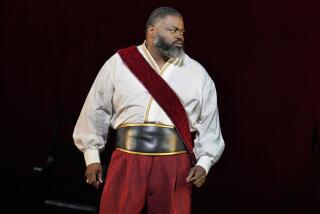Variations on a Rugged Individual
- Share via
Well into his recital at the Dorothy Chandler Pavilion on Monday night, Bryn Terfel, the Welsh bass-baritone who has lately taken the opera world by storm, chit-chatted with the audience. He told us that he was a bit red in the face because he had forgotten his sunscreen when he played golf in the morning.
Yet he ventured into “The Vagabond,” the first of Vaughan Williams’ “Songs of Travel,” commanding Robert Louis Stevenson’s lyric about the glories of the outdoor life--”All I seek, the heaven above / And the road below me”--with all the swaggering, ruddy-faced vigor of a Paul Bunyan.
Terfel is like that, constantly thwarting expectations. One moment he can be a boomer, the next he might scale back to theatrical whisper. He is a big guy, with the build of a linebacker and a voice to match his bulk. Before singing Jacques Ibert’s “Four Songs of Don Quixote,” which were written for Russian bass Feodor Chaliapin to sing in a film about Cervantes’ antihero, Terfel joked that he would never, himself, be able to play the Don in a movie; he’s got too much around the middle for that. He then sang the four touching French songs with a remarkable sensitivity to their fragile wistfulness.
Terfel’s sudden celebrity is in no way surprising. Monday was the first time he had sung for a Los Angeles audience (he made his West Coast debut 11 days earlier at the Orange County Performing Arts Center), and there were a few empty seats. That won’t happen again. He had the crowd in his command the way only the most convincing actors, musicians, dancers and magicians can manage.
Terfel devoted the first half of the recital to a set of Schubert songs, and the house lights went up abruptly just as he began to sing, so the translations of the German texts in the program could be followed. It was a waste of electricity. Terfel is a great mimic. He moves wonderfully. He understands text and he translates every word into tone and gesture. Nor did it matter where one sat--this listener tried the upstairs for the Schubert and then moved down close for Ibert and Williams. Terfel’s out-sized talent and voice project across the footlights and over great distances.
Terfel’s is an opera singer’s Schubert, wrenching drama out of the big melodramatic songs such as “The Erl-King,” catching every delightful bit of play in “The Trout” and melting a music lover’s heart in a gorgeously lyric account of our anthem, “To Music.” It’s overblown, to be sure, but Schubert can take it, if just. The Ibert songs and especially the Vaughan Williams thrive on this sort of interpretation, and one would have also wished that an accompanist less restrained than Malcolm Martineau were here.
And yet this recital kept at least one listener in a state of fret, worrying about what will happen to this young (he’s still under 30) singer who is already great. Terfel is a cocky performer, and it is impossible to resist someone who owns the stage the way he does. But he is also becoming an increasingly mannered singer. A big voice scaled down to ethereal pianis-simos and stage whispers that can be heard across 3,000 seats easily makes him Mr. Goosebump, but he doesn’t always know when to stop. Often there was one more facial gesture and/or showoffy pianissimo than needed. The mannerisms get big reactions; he knows it and seems addicted to getting as many of those reactions as he can.
One also worries about the sharks swimming around Terfel’s career, the same sort of greedy managements that have turned Pavarotti and Perlman into commodities first, artists second. Already Terfel has recorded a crossover hit disc of Rodgers and Hammerstein songs for Deutsche Grammophon that has its appeal but is also an overflowing display case for every calculating Terfel mannerism.
It was, however, to Terfel’s classy credit that on Monday he did not use the stage to hype his R&H.; He instead devoted encores to silly and very amusing Flanders and Swann, along with understated Welsh folk songs. There is still hope. And, in Terfel, near limitless promise.
More to Read
The biggest entertainment stories
Get our big stories about Hollywood, film, television, music, arts, culture and more right in your inbox as soon as they publish.
You may occasionally receive promotional content from the Los Angeles Times.











